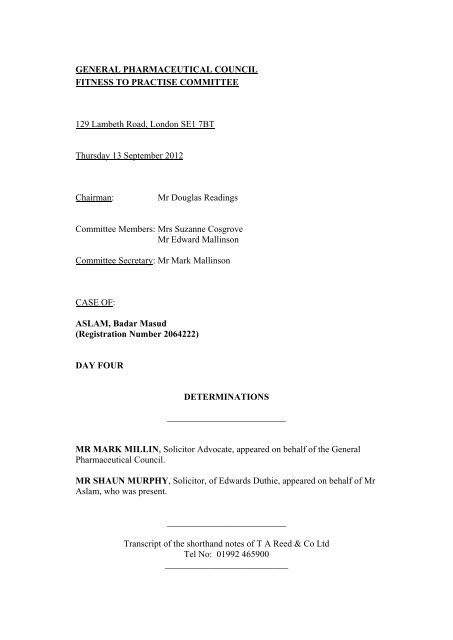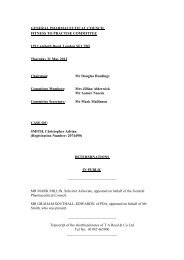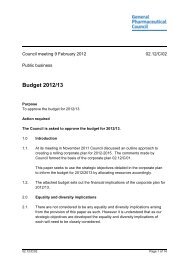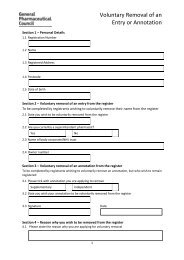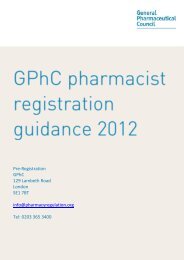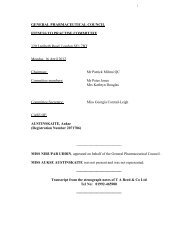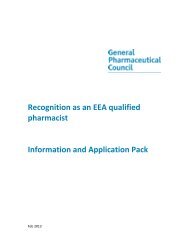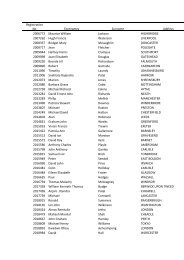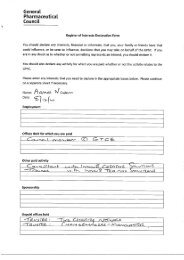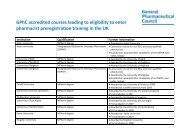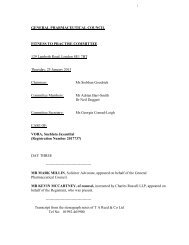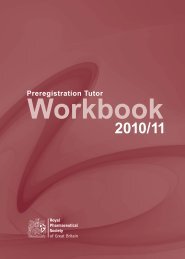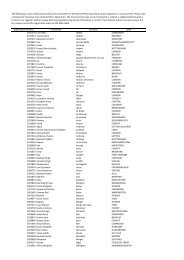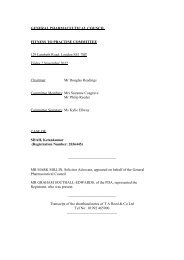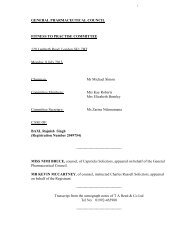Aslam Badar Masud (2064222) - General Pharmaceutical Council
Aslam Badar Masud (2064222) - General Pharmaceutical Council
Aslam Badar Masud (2064222) - General Pharmaceutical Council
Create successful ePaper yourself
Turn your PDF publications into a flip-book with our unique Google optimized e-Paper software.
A(The hearing re-commenced at 11.00 am)DETERMINATION ON FACTBTHE CHAIRMAN: Good morning everybody. I am sorry to have kept you all so long; thankyou for your patience. This is a determination which runs to 14 pages, so I am going to trespasson your patience a little longer, but I will read it for the record now.In this determination the Committee has deleted the name of the town where thecomplainant HS was employed to protect her anonymity.CThe allegation against Mr <strong>Badar</strong> <strong>Aslam</strong>, the Registrant, is set out in the re-amendedParticulars of Allegation as follows:"1. That you, being registered as a pharmacist on 31 July 2006;DE2. Whilst working as a pharmacist at Morrison's Pharmacy, [Blank],on 1 January 2011 intentionally touched HS, the circumstances beingthat:(i) the touching was sexual; and(ii) HS did not consent to the touching; andF(iii) You did not reasonably believe that HS consented to thetouching;3. Your conduct as described above in charge 2 was:G(i) Inappropriate;(ii) Sexually motivated;HT A REED& CO LTD01992-465900Day 4-1
ABThere is a direct dispute between HS on the one hand and Mr <strong>Aslam</strong> on the otherabout the incident in which Mr <strong>Aslam</strong> is alleged to have assaulted HS. There is nodispute that there was some sexually motivated touching between them at a time whenthey were together in an administration office at the store between about 1 o’clockand 1.15 pm that day. It is common ground that Mr <strong>Aslam</strong> was taken to the office byHS to complete a computer form to claim his fee and expenses for working as alocum.CDEFGHS says that Mr <strong>Aslam</strong> put his hands beneath her blouse and touched her back and herfront, putting his hand on her right breast. She says that she objected and he stopped,but that he then touched her again when she stood up, putting his hand down the frontof her blouse and touching her breast, and then rubbing a hand against her vaginalarea, over her jeans. HS says that she protested and he apologised.Mr <strong>Aslam</strong> denies that he did these things, but says that what happened at this secondstage was that as they moved to another computer there was some friendlyconversation and HS smiled, put her finger in her mouth and moved her hipsprovocatively. He put his hands on her hips with her consent. It is common groundthat HS and Mr <strong>Aslam</strong> moved to a second computer in the same room, because theform required was on that other computer, and he sat at the second computer. HSsays that Mr <strong>Aslam</strong> then took her hand and put it against his penis, over his trousers,and he then rubbed that part of his body against her hand, and then against the side ofher leg. HS says that she was shocked and frightened, realising she was alone in alocked store with Mr <strong>Aslam</strong>, since Mr Pippard had gone to the pharmacy so that therewould be two members of staff in the pharmacy whilst Mr <strong>Aslam</strong> was in the store.She says she concluded the filling in of the form as quickly as possible, making threecopies, each of which was signed by her and by Mr <strong>Aslam</strong>, sent it by email, and gaveMr <strong>Aslam</strong> the copies he needed, before accompanying him to the main foyer of thestore and letting him return to the pharmacy.HT A REED& CO LTD01992-465900Mr <strong>Aslam</strong> admits that on one occasion he put his right hand under HS’s blouse andtouched her right breast, after he had put a hand on her shoulder, and asked herwhether she was happy with this, and she had told him she liked it. He says that HSDay 4-4
ABCDEFGHT A REED& CO LTD01992-465900deliberately touched him in the region of his penis. He says that she had flirted withhim, had paid one or two visits to the pharmacy during the morning, and had indulgedin smiling and flirtatious behaviour towards him when she was there. She deniesmaking any visits to the pharmacy, apart from the occasions when she unlocked thepharmacy at about 9 am and when she later let Mr <strong>Aslam</strong> into the store to use thetoilets and then returned with him to the pharmacy, where he gave her some coughmedicine. She says that there were no other occasions shown on the CCTV record,and she has produced her own log or schedule of the relevant CCTV images (page 15of the <strong>Council</strong>’s bundle). Mr <strong>Aslam</strong> says that while they were in the administrationoffice together, and he was seated at the second computer, HS deliberately put herhand into his lap, over his penis. However, Mr <strong>Aslam</strong> says that HS’s mood changedtowards him after he had moved his leg so as to dislodge her hand from his lap, andhad told her he was married. She had asked him how his wife would feel if she foundout what had happened, and he did not reply.In the hearing before this Committee Mr <strong>Aslam</strong>’s case, as presented by Mr Murphy,has been that HS felt misled and was upset by Mr <strong>Aslam</strong>’s rejection, and that whenshe was later asked by Mr Pippard why she appeared upset she made up the storyabout Mr <strong>Aslam</strong> assaulting her. After that, the argument is, HS was trapped intohaving to continue to put forward the same dishonest account of events to heremployers, to the police, and now to this Committee, because she could not admit thatshe had made a false allegation.That is an abbreviated and generalised account of the principal matters in dispute inthis complicated case, where there are numerous other disputes of fact which arerelied upon to support or rebut the cross-allegations. It might not have been necessaryto attempt to summarise the issues of fact if they had been properly broken down intoindividual Particulars of Allegation, instead of being loosely described as “touching”in the re-amended Particulars of Allegation. However, the Committee has carefullyconsidered all the evidence, and has decided all the matters in issue, whether they areexpressly mentioned in this determination or not, wherever it was necessary to do soin order to determine the factual allegations made against Mr <strong>Aslam</strong> by the <strong>Council</strong>.Day 4-5
ABCDEFGOral evidence was given by HS and by Mr <strong>Aslam</strong>, presenting their differing accounts.There is a general practice in these proceedings that witnesses are permitted to readtheir witness statements aloud to the Committee by way of evidence in-chief.However, in order to ensure the maximum forensic scrutiny of the conflictingaccounts, the Committee invited submissions about the way in which HS and Mr<strong>Aslam</strong> should give evidence, and each of them was examined in-chief in full. Theyhad of course had the opportunity to refresh their memory beforehand by reading theirwitness statements. The same procedure was adopted with Mr Pippard. The onlyother witness who gave oral evidence for the <strong>Council</strong> was Miss Sarah Cheetham, whogave evidence about complaints made to her by HS shortly after the events of 1January 2011, her evidence being relied upon by the <strong>Council</strong> as 'recent complaint'.She was permitted to have her statements made to the police and to the <strong>Council</strong> standas her evidence in-chief.In addition to the oral evidence of Mr <strong>Aslam</strong> himself, the Committee heard evidencefrom several witnesses called on his behalf. Mrs Janet Hopkins gave evidence inaccordance with her witness statement dated 29 August 2012 and her letter dated 21August 2011, and told the Committee that she has worked as a dispenser with Mr<strong>Aslam</strong> at Sainsbury’s, Newbury Park, and has known him since January 2007. Shesaid that on 4 January 2011, which was her first day back at work after the New Yearholiday, he told her he had worked as a locum on 1 January at a Morrison's store, anda female member of staff had 'come on' to him. She described Mr <strong>Aslam</strong> as “…anhonest man of good moral fibre and decent to the core”.Miss Jessie Sangha told the Committee she worked with Mr <strong>Aslam</strong> in the pharmacydepartment of Sainsbury’s, Newbury Park, from May 2010 until June 2012, and thatall the assistants in the pharmacy department were female, and none of them had everfelt that Mr <strong>Aslam</strong> acted unprofessionally or might be capable of sexual assault. Hewas pleasant to work with, and had been supportive in helping her to find a newcareer.HT A REED& CO LTD01992-465900Day 4-6
AMr Brij Valla, a Sainsbury’s Pharmacy Compliance and Service Support Manager,also spoke of Mr <strong>Aslam</strong>’s good character. This was confirmed by Mrs Wendy Henry,the Human Resources Manager at Sainsbury’s, Newbury Park.BIn addition to the oral evidence, the written witness statement of Ms Rubina Duka wasread to the Committee. She confirmed the large number of occasions when Mr <strong>Aslam</strong>had worked as a locum pharmacist through the agency which she works for, and toldthe Committee that there had been no complaints about him.CDEThe Committee had the advantage of seeing some short selected extracts fromrecordings made by CCTV cameras in the Morrison's store on 1 January 2011. Anumber of documents were included in a bundle prepared by the <strong>Council</strong> and anotherbundle prepared by Mr <strong>Aslam</strong>’s solicitors. These included the witness statementsmade at various times by HS, Miss Cheetham and Mr Pippard, the handwritten notesmade by Miss Cheetham of the complaint made to her by HS, part of a copy of theclaim form completed on the Morrison's’ computer by Mr <strong>Aslam</strong>, the pre-preparedstatement handed by Mr <strong>Aslam</strong> to the police when they questioned him, transcripts ofthe evidence given by HS and Mr <strong>Aslam</strong> at the Crown Court trial, a further witnessstatement signed by Mr <strong>Aslam</strong> which was prepared for these proceedings, andstatements from other people, including references and testimonials to Mr <strong>Aslam</strong>’sgood character.FGHT A REED& CO LTD01992-465900The Committee considered all the arguments and submissions advanced by Mr Millinon behalf of the <strong>Council</strong>, and by Mr Murphy on the Registrant’s behalf. Mr Millinurged the Committee to accept HS as a witness of truth. He submitted that it wasunlikely that she, as a personnel manager in a responsible position, would invent suchan allegation against Mr <strong>Aslam</strong>. He identified two disputed issues of fact which, hesuggested, would be capable of corroborating HS’s evidence. The first was a disputeabout whether HS had been informed on the morning of 1 January 2011 by GemmaKeen about the marital status of Mr <strong>Aslam</strong>. HS told the Committee that when Mr<strong>Aslam</strong> touched her she said words to the effect: “What are you doing? Stop it. Ithought you were married”. It had been suggested on behalf of Mr <strong>Aslam</strong> thatGemma Keen had denied telling HS that Mr <strong>Aslam</strong> was married, and therefore HSDay 4-7
ABcannot have known he was married, and cannot have said what she claims to havesaid to Mr <strong>Aslam</strong>. Mr Millin pointed to part of the summing-up to the jury of HisHonour Judge Overbury in Ipswich Crown Court at Mr <strong>Aslam</strong>’s trial, in which hesaid:“Well, Gemma’s evidence, and the Defence have pointed this out to you,Gemma’s evidence is no, she had no conversation with the Defendant abouthis marital status.”CMr Millin invited the Committee to prefer the evidence of HS, since Gemma Keen didnot give evidence to the Committee.DEFGHT A REED& CO LTD01992-465900The second factual dispute identified by Mr Millin was the question whether HS had,as Mr <strong>Aslam</strong> claimed, made one or two visits to the pharmacy during the course of themorning of 1 January 2011, when she behaved towards him, Mr <strong>Aslam</strong> alleges, in aflirtatious way. Mr Millin invited the Committee to accept HS’s evidence that she hadnot paid any visits to the pharmacy except those which appeared in the extracts fromthe CCTV record in her log, which appeared in the <strong>Council</strong>’s bundle at page 15. Ifthat is correct, Mr Millin submitted, then Mr <strong>Aslam</strong>’s evidence cannot be relied upon.Mr Millin also submitted that Mr <strong>Aslam</strong> admitted in his evidence that he had told a lieto HS when they were together, namely his statement that his marital status was“complicated” whereas he was in fact happily married.Mr Millin asked the Committee, rhetorically, even if what Mr <strong>Aslam</strong> had said wastrue, and she had felt scorned by the rejection by him of her advances, whether itwould be sufficient to cause a responsible personnel manager like HS to “wreak acampaign of vengeance” upon Mr <strong>Aslam</strong>, lying to her employers, the Police, theCrown Court and this Committee. Mr Millin pointed out that HS had reported Mr<strong>Aslam</strong>’s alleged behaviour towards her to family, friends and employer. Mr Millinwent on to suggest that Mr <strong>Aslam</strong> had made significant changes to his account ofevents as the case had proceeded, and in particular he suggested that Mr <strong>Aslam</strong> hadchanged his story, as a result of cross-examination in the Crown Court, about whetherhe believed HS had been wearing a bra under her blouse on 1 January 2011.Day 4-8
ABMr Murphy first submitted that the Particulars of Allegation should be read in such away that the entire complaint against Mr <strong>Aslam</strong> depended on HS’s credibility, and thewhole case should stand or fall as one. He pointed out that the case had originallybeen presented as a re-hearing of the trial of Mr <strong>Aslam</strong> in the Crown Court on thecharge of sexual assault.CDEMr Murphy told the Committee that Mr <strong>Aslam</strong> is a man of good character, and that itis improbable that he would be guilty of the misconduct alleged. He said that it is theexperience of the Courts and Committees that in the area of personal and sexualintimacy it is not unknown for complainants to make unjustified, exaggerated oruntrue complaints. He submitted that there are three possible conclusions: theCommittee accepts the evidence of HS in its entirety and finds the allegation proved;the Committee accepts the evidence of Mr <strong>Aslam</strong> in its entirety and finds theallegation not proved; the Committee does not know, in which case it must find infavour of Mr <strong>Aslam</strong>. When it was suggested to him, Mr Murphy accepted that therewas a possibility that there might have been some misunderstanding between HS andMr <strong>Aslam</strong>, and the Committee might find that some events occurred as alleged andothers did not, and that the events which occurred might or might not beinappropriate, sexually motivated or contrary to principle 3.9, as alleged in theParticulars of Allegation.FGMr Murphy submitted on behalf of Mr <strong>Aslam</strong> that there was a lack of independentevidence to corroborate HS’s version of events, in circumstances where there mighthave been expected to be such evidence, including the absence of any sign of achange in the demeanour of Mr <strong>Aslam</strong> and HS, as shown in the CCTV images beforeand after the events which occurred between about 1 o’clock and 1.15 pm on 1January 2011. Another matter was that HS had shown no signs of anxiety or distresswhen she twice made telephone calls from the administration office to the pharmacy.HT A REED& CO LTD01992-465900It is not possible within the scope of this determination to note all of Mr Murphy’sarguments, but the Committee has taken them all into account, including thesuggestion that HS might have been precipitated into making her initial complaint byDay 4-9
ABCDMr Pippard. Mr Pippard told the Committee that he told HS that if she did not informthe store manager, he would. Mr Murphy suggested that the complaint, once made,gained momentum and went out of HS’s control, so that she could never admit thatshe had made a false allegation.The Committee considered and rejected the interpretation of the re-amendedParticulars of Allegation which was suggested by Mr Murphy on behalf of Mr <strong>Aslam</strong>.The Committee recognises that the Particulars of Allegation were, unfortunately,drawn in such a way as to mirror the wording of the indictment upon which Mr <strong>Aslam</strong>was previously charged with the criminal offence of sexual assault. However, Mr<strong>Aslam</strong> and his advisers must have realised at all times, since the <strong>General</strong><strong>Pharmaceutical</strong> <strong>Council</strong> started proceedings against Mr <strong>Aslam</strong>, that the <strong>Council</strong> wasconcerned not to re-try that criminal case, but to protect the public by establishingwhat Mr <strong>Aslam</strong> had done at the Morrison's store on 1 January 2011 and whether, byreason of what he had done, his fitness to practise as a pharmacist was impaired.EFMr Murphy informed the Committee that he has substantial experience of fitness topractise proceedings at the <strong>General</strong> Medical <strong>Council</strong>, if not at the <strong>General</strong><strong>Pharmaceutical</strong> <strong>Council</strong>, and that he has studied the <strong>General</strong> <strong>Pharmaceutical</strong> <strong>Council</strong>’srules. Although the Particulars of Allegation did not condescend to particulars aboutthe incidents of sexual contact which were alleged to have occurred, the factualallegations made cannot have come as a surprise to Mr <strong>Aslam</strong> or his representatives,since they are the same facts as were alleged in the previous criminal trial.Furthermore, in accordance with the rules, the statements of the witnesses relied uponwere supplied to Mr <strong>Aslam</strong>, or his solicitors, in advance of the hearing.GHT A REED& CO LTD01992-465900There is therefore no risk of injustice in this Committee approaching this case on thebasis that it is for the <strong>Council</strong> to prove what Mr <strong>Aslam</strong> is alleged to have done, and onthe basis that the Committee may find some factual allegations proved and others notproved. The introduction of the word "and" between the individual factual allegationsin the re-amended Particulars of Allegation does not, as a matter of logic or grammar,mean that all the individual factual allegations stand or fall together.Day 4-10
ABCThe Committee has heard, effectively, about three alleged incidents of sexual contactin the administration office on the afternoon of 1 January 2011. The first wastouching by Mr <strong>Aslam</strong> of HS’s shoulder and then her right breast, when Mr <strong>Aslam</strong>and HS were seated in front of the first computer. The second was a touching of HS’sright breast by Mr <strong>Aslam</strong> when she was standing up, facing him, and the rubbing ofHS’s vaginal area by Mr <strong>Aslam</strong>. The third was the taking of HS’s hand by Mr <strong>Aslam</strong>and the placing of it in his lap over his penis while he was seated at the secondcomputer, and a subsequent “dry humping” action against HS’s body. Before makinga decision on the Particulars of Allegation, the Committee has found it necessary todecide which of these incidents is proved by the <strong>Council</strong> to have occurred as alleged.DThe first touching is admitted by Mr <strong>Aslam</strong> to have occurred. He has described in hisevidence how he was seated close behind her as she sat at the first computer. He sayshe put his hand on her shoulder and she confirmed that she felt comfortable with this,and then he put his right hand under her blouse and up to her breast. HS’s version isnot very different, but she says the two were seated with their knees interlocking, andshe denies that she agreed that she was comfortable with being touched by Mr <strong>Aslam</strong>.EFGHaving carefully scrutinised the layout and dimensions of the room, desks and chairsof the office where the events occurred, all of which are shown in a photograph, theCommittee is not satisfied that HS and Mr <strong>Aslam</strong> could have been seated in relation toeach other as HS has said, and prefers Mr <strong>Aslam</strong>’s version.On the balance of probabilities the Committee prefers Mr <strong>Aslam</strong>’s evidence, andtherefore rejects HS’s evidence. The Committee is strongly influenced by theindependent evidence of good character given on behalf of Mr <strong>Aslam</strong>, which isrelevant to both the probability of his behaving as alleged, and his credibility. TheCommittee did not accept that Mr <strong>Aslam</strong> deliberately lied to HS when, as he admitted,he told her that his marital status was “complicated”. The Committee understands thisremark to have been no more than an understandable attempt to avoid discussion ofhis family life.HT A REED& CO LTD01992-465900Day 4-11
ABCIn making this finding of fact, and other findings, the Committee was unable to acceptthe line of argument advanced by Mr Millin that HS was unlikely to indulge in a briefsexual dalliance because she was at that time in a new relationship with somebodywhom she had been dating for only two weeks, who has subsequently become herhusband, and she was, as HS put it, “loved up”. The Committee considered that, as ayoung woman who was separated from her husband and was embarking on a newrelationship, she might have been tempted to indulge in some flirtatious behaviourwhich she regretted soon afterwards. That was more likely to occur in the informalsurroundings of an empty store on a public holiday, when she was on duty butcasually dressed.DEFThe Committee attached no weight to the argument that HS could not have knownabout Mr <strong>Aslam</strong>’s marital status. The Committee was told in evidence by Mr <strong>Aslam</strong>,and it was confirmed by Ms Rubina Duka, that Mr <strong>Aslam</strong> had worked as a locumpharmacist with Gemma Keen at the Morrison's store in [Blank] previously. TheCommittee noted that in the Crown Court trial the transcript of the summing-upsuggests that Gemma Keen had denied talking to Mr <strong>Aslam</strong> about his marital statuson 1 January 2011. However the Committee was not able, on the evidence, toconclude that she had no other way of learning about Mr <strong>Aslam</strong>’s marital status.Indeed, it appears that Gemma Keen may have worked with Mr <strong>Aslam</strong>’s cousin, whois also a pharmacist and had worked as a locum at the same Morrison's store.Furthermore, the Committee could not be sure how much weight should be attachedto evidence emanating from Gemma Keen, who did not give evidence before theCommittee, and who was reported to have been dismissed from Morrison's.GHT A REED& CO LTD01992-465900The Committee has considered the details of the allegation concerning what theCommittee has referred to as the second alleged incident of sexual contact. It doesnot accept that the physical movements of the parties are likely to have occurred in theway described. In particular it cannot accept that Mr <strong>Aslam</strong>, while facing HS, wouldhave been able to put his right hand down the front of her blouse so as to touch herright breast. The Committee takes into account the way in which his actions wouldhave been impeded by the chairs and the layout of the room. It considers that it wouldhave been impossible to do as HS alleges, including the touching and rubbing of herDay 4-12
ABvaginal area, without her consent. It does not believe that she would have consentedto such behaviour and believes that she would easily have been able to resist it, if itoccurred. The Committee finds that this second incident, on the balance ofprobabilities, did not occur. The Committee did not find it necessary to make anyfinding as to whether HS behaved in the provocative or flirtatious way suggested byMr <strong>Aslam</strong>.CDEConcerning what the Committee has called the third incident, after HS and Mr <strong>Aslam</strong>had moved to a second computer, the Committee considers it would have beenimpossible for Mr <strong>Aslam</strong> to compel HS to put her hand in his lap, over his penis. Itdoes not accept that HS was obliged to come close to Mr <strong>Aslam</strong> in order to assist himin completing his claim form on the second computer. It notes that the form is simpleto complete and the required information is not complicated. It does not accept thatMr <strong>Aslam</strong> would have been too agitated to complete the form satisfactorily byhimself. Therefore HS, if she had been unwilling to go near Mr <strong>Aslam</strong>, would nothave been obliged to do so. The Committee has taken account of the size and layoutof the room. The Committee concludes that any sexual contact which occurred at thesecond computer would have been, so far as HS is concerned, consensual. TheCommittee concludes that, whether or not HS touched Mr <strong>Aslam</strong>, this third incidentdid not involve any non-consensual touching of HS by Mr <strong>Aslam</strong>.FGHT A REED& CO LTD01992-465900The Committee carefully considered the CCTV images. It did not feel able to relyupon the selection of CCTV images, preserved on the disk which was created for theCrown Court proceedings and shown in evidence before the Committee, as a completeand comprehensive record of relevant events. Nor could the Committee conclude thatthe log or schedule compiled by HS (page 15 of the <strong>Council</strong>’s bundle) could be reliedupon as a definitive record of all the occasions when HS visited the pharmacy on themorning of 1 January 2011, although the Committee accepts that it was compiled ingood faith by HS after she had exhaustively viewed all the CCTV footage for therelevant day. Approximately 3 hours of that footage, showing what happenedbetween about 9.06 am and 12.05 pm, was not copied on to the disk, so that theCommittee could not view it. Nor was any CCTV footage inside the pharmacypresented to the Committee. The possibility remains that some relevant movementsDay 4-13
Amay have been inadvertently overlooked. The possibility cannot be excluded that HSpaid one or two visits to the pharmacy during the morning, as alleged by Mr <strong>Aslam</strong>.BCThe Committee did, however, agree that the demeanour of Mr <strong>Aslam</strong> and of HS isclearly shown in the CCTV images. Their demeanour is casual and relaxed, bothbefore and after the alleged incidents. There is no sign that either HS or Mr <strong>Aslam</strong>was upset, agitated or distressed. Neither is distancing himself, or herself, from theother. There is no hurry about their movements. The Committee concludes thatneither party was distressed or agitated or embarrassed as a result of what occurred inthe office between about 1 o’clock and 1.15 pm.DEFGThe Committee also accepts the force of Mr Murphy’s submission that HS might havefound that her original complaint to Mr Pippard, given to explain why she was cryingin her office, ran out of control. He told her that if she did not report it to the storemanager he would do so. Miss Cheetham quickly escalated the matter within theMorrison's management hierarchy, had reported the matter to the Police, andaccompanied HS when she made her statement to the Police. It would be difficult foranybody in HS’s position, as a personnel manager, to have to acknowledge that shehad behaved inappropriately at her place of work, even if she had not initiated theinappropriate behaviour. The Committee noted that Miss Cheetham described HS,whom she has known since she was a child, as naive. This accords with theCommittee’s own observation of HS.Having anxiously examined all the evidence, the Committee has concluded, on thebalance of probabilities, that nothing occurred in the office between HS and Mr<strong>Aslam</strong> without the consent of both parties. This Committee has no jurisdiction, and isnot entitled, to make any finding concerning HS’s behaviour, and it does not do so. Inrespect of Mr <strong>Aslam</strong>, it finds as fact that he indulged in a brief incident of sexualcontact, and it has not been proved that it was non-consensual.HT A REED& CO LTD01992-465900The Committee has noted that, in the course of giving evidence, Mr <strong>Aslam</strong> admittedParagraph 2 and sub-paragraph 2 (i) of the re-amended Particulars of Allegation; thatis, that he intentionally touched HS and that the touching was sexual. This appears toDay 4-14
Abe a concession which he has always been prepared to make, and he told theCommittee that he accepted he had behaved inappropriately.BBearing all these matters in mind, by reference to the re-amended Particulars ofAllegation, the Committee finds proved:Paragraph 1, which is admitted and found proved;CParagraph 2, the stem and sub-paragraph (i), namely that Mr <strong>Aslam</strong>intentionally touched HS and that the touching was sexual.DEFThe Committee finds not proved sub-paragraphs 2 (ii) and 2 (iii), namely that HS didnot consent to the touching and that Mr <strong>Aslam</strong> did not reasonably believe that HSconsented to the touching.For the avoidance of doubt, the touching in question is that which the Committeedescribed previously as the first incident, namely the touching by Mr <strong>Aslam</strong> of HS’sshoulder and then her right breast, inside her blouse.The Committee next considered the remainder of the re-amended Particulars ofAllegation. It considers that the facts which have been found proved are behaviourwhich is inappropriate by a pharmacist who is on duty at his place of work, involvinganother person working there. Mr <strong>Aslam</strong> failed to maintain proper professionalboundaries with somebody with whom he came into contact during the course of hisprofessional practice. The Committee therefore finds proved:Paragraph 3 in its entirety, including sub-paragraphs 3 (i), 3 (ii) and 3 (iii).GHT A REED& CO LTD01992-465900As a result of those findings we shall have to go to the second stage of theseproceedings, which will be to consider whether the Registrant's fitness to practise isimpaired by reason of misconduct. I anticipate that perhaps the parties would like alittle time to consider that determination.Day 4-15
A(Short adjournment from 11.35 am until 12.05 pm, after which the Committee heardsubmissions on impairment and went into camera from 12.30 pm until 3.10 pm)DETERMINATION ON IMPAIRMENTBTHE CHAIRMAN: This is our determination concerning impairment of fitness topractise.CThe Committee considered the submissions made by Mr Millin on behalf of the<strong>Council</strong> and those made by Mr Murphy on behalf of Mr <strong>Aslam</strong>. It has no hesitation insaying that the facts, admitted or found proved, amount to misconduct.DEPharmacists frequently work as locums. They are trusted to go to pharmacies wherethey are previously unknown, to work with staff who are not known to them, and toadvise and provide medicines, sometimes in intimate circumstances, to patients whoare not known to them. The public must be able to trust registered pharmacists tobehave properly at all times, and to respect professional boundaries. Mr <strong>Aslam</strong>wholly failed to respect proper professional boundaries when he indulged in sexuallymotivated touching with one of the employees, during his working hours, at the placewhere he was working as a locum. His conduct fell well below the standard whichfellow members of the profession would expect, and would be regarded by suchfellow professionals as deplorable.FGThe Panel has had regard to Rule 5 of the <strong>General</strong> <strong>Pharmaceutical</strong> <strong>Council</strong> (Fitness toPractise and Disqualification etc., Rules) Order 2010, which specifies criteria forjudging whether fitness to practise is impaired. It is satisfied that Mr <strong>Aslam</strong>’sbehaviour has brought the profession into disrepute, and that it has breached one ofthe fundamental principles of the profession of pharmacy. For that proposition it isnecessary only to refer to principle 3.9 of the standards of conduct, ethics andperformance published by the <strong>Council</strong> in September 2010:HT A REED& CO LTD01992-465900“You must: Maintain proper professional boundaries in your relationship withpatients and others that you come into contact with during the course of yourDay 4-16
Aprofessional practice and take special care when dealing with vulnerablepeople.”BCMr Murphy has submitted on behalf of Mr <strong>Aslam</strong> that his fitness to practise is notcurrently impaired because he is, and previously was, a man of impeccable character,and this was a short, isolated incident in an otherwise unblemished career. Hesubmits that Mr <strong>Aslam</strong> has insight into his failing which occurred on 1 January 2011.Mr <strong>Aslam</strong> himself, in his evidence, told the Committee that he recognises that hisbehaviour was inappropriate, and he is sorry for it. Mr Millin, on behalf of the<strong>Council</strong>, has acknowledged that there is no real risk of any repetition by Mr <strong>Aslam</strong> ofhis misconduct.DEIn a case of sexual misconduct it is more difficult for a Registrant to demonstrate thathe has remedied the impairment of his fitness to practise than in a case of clinicalerrors or failings. The Committee notes that the events of 1 January 2011 led to a trialin Ipswich Crown Court in September 2011, at which Mr <strong>Aslam</strong> gave evidenceconfirming that he had indulged in consensual sexual contact while he was on duty asa locum pharmacist. Damage to the reputation to the profession is thereforecomparatively recent. These proceedings may themselves be reported.The Committee has had regard to the observations of Mrs Justice Cox in the case ofCHRE v Nursing and Midwifery <strong>Council</strong> and Grant [2011] EWHC 927 (Admin):FG“In determining whether a practitioner’s fitness to practise is impaired byreason of misconduct, the relevant panel should generally consider not onlywhether the practitioner continues to present a risk to members of the public inhis or her current role, but also whether the need to uphold proper professionalstandards and public confidence in the profession would be undermined if afinding of impairment were not made in the particular circumstances.”HT A REED& CO LTD01992-465900Mr Murphy has urged the Committee to determine that the circumstances of thepresent case are different from those in Cheatle v <strong>General</strong> Medical <strong>Council</strong> [2009]EWHC 645 (Admin), where Mr Justice Cranston said that a doctor’s behaviour at aDay 4-17
ABparticular time may be so “egregious” that, looking forward, the doctor is simply notfit to practise medicine without restrictions, or maybe at all. Mr Murphy points outthat that case involved a sexual relationship between a doctor and a patient, and not abrief incident involving two consenting adults outside the pharmacy itself. TheCommittee has borne these points in mind. It accepts that Mr <strong>Aslam</strong> has good insightinto his failing. It acknowledges that, unlike the Nursing and Midwifery <strong>Council</strong>, the<strong>General</strong> <strong>Pharmaceutical</strong> <strong>Council</strong> has the power to issue a warning to a Registrant evenif it makes a finding that the Registrant’s fitness to practise is not impaired.CDHaving weighed all these matters, the Committee has decided that, on the facts of thepresent case, Mr <strong>Aslam</strong>’s fitness to practise is currently impaired by reason of hismisconduct. The need to uphold professional standards and public confidence in theprofession would be undermined if a finding of impairment were not made in theparticular circumstances.That is our decision, and it means that we must go to the third stage of proceedings,which is to consider whether any, and if so, what, sanction is appropriate.E(The Committee heard submissions on sanction, and went into camera at 4.07pm, adjourning until 11 am on Friday 14 September 2012)FGHT A REED& CO LTD01992-465900Day 4-18
AGENERAL PHARMACEUTICAL COUNCILFITNESS TO PRACTISE COMMITTEEB129 Lambeth Road, London SE1 7BTFriday, 14 September 2012CChairman:Mr Douglas ReadingsCommittee Members: Mr Edward MallinsonMrs Suzanne CosgraveDCommittee Secretary: Mr Mark MallinsonCASE OF:EASLAM, <strong>Badar</strong> <strong>Masud</strong>(Registration Number <strong>2064222</strong>)(DAY FIVE)-------------------------------------FMR MARK MILLIN, solicitor advocate, appeared on behalf of the <strong>General</strong><strong>Pharmaceutical</strong> <strong>Council</strong>.MR SHAUN MURPHY, of Edwards Duthie, solicitors, appeared on behalf of theRegistrant, who was present.G-------------------------------------Transcript from the stenograph notes of T A Reed & Co LtdTel No: 01992-465900-------------------------------------HT A REED& CO LTD01992-465900(The hearing resumed at 11.00)Day 4-19
ADETERMINATION OF THE COMMITTEE ON SANCTIONBTHE CHAIRMAN: The current interim order upon Mr <strong>Aslam</strong>'s registration isrevoked.The Committee has had regard to the <strong>General</strong> <strong>Pharmaceutical</strong> <strong>Council</strong>'s publishedCIndicative Sanctions Guidance, which says that, in determining the appropriatesanction to be imposed, the Committee may need to consider some or all of thefollowing:D1. Any mitigating or aggravating features of the facts found proved.2. The personal circumstances of the registrant and any mitigation advanced.E3. Any testimonials and character references adduced in support of the registrant.4. Any statement of views provided to the Committee by a patient or anyindividual affected by the conduct of the registrant.F5. Any statement of views provided to the Committee by the <strong>Council</strong>.Mr Millin has expressed the view of the <strong>Council</strong> that the circumstances of Mr <strong>Aslam</strong>'sGmisconduct are too serious for the giving of a warning, that an order imposingconditions on his registration would not be appropriate, and that a short period ofsuspension would be appropriate and proportionate to mark the disapproval of theHT A REED& CO LTD01992-465900profession and the public of Mr <strong>Aslam</strong>'s behaviour. He suggested that there would beno need for a review at the end of the period of suspension because Mr <strong>Aslam</strong> hasDay 4-20
Ademonstrated insight into his misconduct, and there is no real risk of such misconductbeing repeated.BOn behalf of Mr <strong>Aslam</strong>, Mr Murphy has submitted that a period of suspension wouldbe excessive and disproportionate. Mr <strong>Aslam</strong> has given evidence at the sanctionsstage of these proceedings, and has told the Committee he has received no assurancethat he would keep his employment with Sainsburys, Newbury Park, if his registrationCwas suspended, even for a short period. Mr Murphy has suggested that a warningwould be sufficient and has pointed out that, in some cases, a Fitness to PractiseCommittee has taken the view that a public finding that a practitioner's fitness topractise is impaired is, by itself, sufficient sanction.DThe facts found proved against Mr <strong>Aslam</strong> constitute a breach of Principle 3.9 of theStandards of Conduct, Ethics and Performance published by the <strong>Council</strong> in September2010 because there was a failure to maintain proper professional boundaries betweenEMr <strong>Aslam</strong> and an employee at the place where he was working as a locum pharmacist.The misconduct, although deliberate, was not premeditated, did not involve a patientor a pharmacy employee, and did not occur in the pharmacy itself. It was an isolatedevent, not prolonged or repeated, in the unusual circumstances that he found himselfFalone in an empty store with a female employee of a similar age and professionalstatus to himself. There was no abuse by him of a position of authority. TheCommittee is satisfied that there is no real risk of repetition.GThe Committee has received evidence concerning the considerable responsibility forthe support and care of several members of his family which Mr <strong>Aslam</strong> and his wifehave to bear. Since about April 2011, following his arrest on a charge of sexualHT A REED& CO LTD01992-465900assault, he has been unable to undertake any locum work as a practical consequenceof the interim order of conditions imposed on his registration. Locum engagementsDay 4-21
Apreviously provided a very substantial proportion of his income. During the sameperiod Mr <strong>Aslam</strong> has had the anxiety and distress of criminal proceedings hangingover him, which might have led to imprisonment, and then these proceedings, whichBmight have brought to an end his career in the profession of pharmacy. He enjoys theprofession in which he is held in high esteem. He was not eligible for legal aid andwas obliged to fund the costs of his own defence in the criminal proceedings, and wasunable to recover a substantial proportion of those costs from public funds followingChis acquittal in September 2011. He has also been obliged to fund the costs of hisown defence of these proceedings at the <strong>General</strong> <strong>Pharmaceutical</strong> <strong>Council</strong> because hisdefence society refused indemnity.DAlthough he must accept the consequences of the misconduct which has been proved,Mr <strong>Aslam</strong> has told the Committee, and the Committee accepts, that he and othermembers of his family have suffered a loss of respect in the community where theylive as a result of the allegation of non-consensual sexual assault which was madeEagainst Mr <strong>Aslam</strong>, but which was not proved in the criminal proceedings or in theseproceedings.The Committee has received an abundance of good testimonials and referencesFconcerning Mr <strong>Aslam</strong>. From these it is apparent that Mr <strong>Aslam</strong>'s behaviour hasbecome known widely beyond his own employers. Supportive messages have beenreceived from senior and junior colleagues. He has scored well in his employer'sroutine appraisal process and has achieved a remarkable 100 per cent in a confidentialGconsultative process in which employees are invited to comment anonymously abouttheir managers. There is no record of any complaint ever having been made about Mr<strong>Aslam</strong> by any patient or work colleague. There has been no complaint arising fromHT A REED& CO LTD01992-465900any of his numerous locum engagements. Mr Brij Valla, a Sainsburys PharmacyCompliance and Service Support Manager, told the Committee that he regarded MrDay 4-22
A<strong>Aslam</strong> as an excellent pharmacist, and had selected him to mentor pre-registrationpharmacy students. The Committee notes Mr <strong>Aslam</strong>'s commitment to the professionand to the development and career progression of others.BThe Committee notes that the purpose of any sanction is not to punish the Registrantbut to protect the public, to maintain public confidence in the profession and todeclare and uphold proper standards of behaviour by members of the profession. InCorder to ensure that its response to Mr <strong>Aslam</strong>'s misconduct is no more severe than isfair and proportionate, the Committee has first considered whether it is necessary toimpose any sanction.DAlthough it is unlikely that the circumstances of this case, which are unusual, willever occur again, pharmacists, particularly when they are working as locums, must beaware of the need to maintain professional boundaries at all times. The Committeeconsiders it is necessary to send to the profession and to the public a clear message ofEdisapproval in respect of any failure to maintain such boundaries. However, theCommittee is satisfied that the finding of impairment of fitness to practice madeagainst Mr <strong>Aslam</strong>, which is likely to be reported, will send that message to theprofession and to the public.FThe Committee has considered whether it is also necessary to send a message to theRegistrant, Mr <strong>Aslam</strong>. The bringing of proceedings against him by the <strong>General</strong><strong>Pharmaceutical</strong> <strong>Council</strong> has already had a grave effect upon him, his family and hisGlivelihood. The public announcement of the finding of impairment of his fitness topractise will convey to Mr <strong>Aslam</strong> the disapproval of the profession and the public andthe <strong>Council</strong> for his behaviour, and will be a full and effective reminder that hisHbehaviour was inappropriate.T A REED& CO LTD01992-465900Day 4-23
AThe Committee has heard Mr <strong>Aslam</strong>'s own expression of regret and remorse, and issatisfied that it is entirely genuine. There can be no doubt that he has full insightconcerning his inappropriate behaviour. Mr Millin has said on behalf of the <strong>Council</strong>Bthat there is no real risk of repetition, and the Committee agrees. The Committee issatisfied that it is not necessary to send any further message to Mr <strong>Aslam</strong>. Thefinding of impairment is by itself sufficient sanction.CConcerning the other sanctions which are available to it, the Committee would saythat it agrees that conditions would be inappropriate, and it considers that suspensionwould be disproportionate and unfair. It would deprive the public of the services of agood and popular pharmacist who has thoroughly learned the lesson of hisDmisbehaviour. Neither party has suggested that erasure would be appropriate in thiscase, and the Committee agrees.The Committee has therefore resolved, in the exceptional circumstances of thisEparticular case, to impose no sanction.That concludes our determination and it concludes this case. It remains to thank youfirst, Mr <strong>Aslam</strong>, for attending to assist us with this inquiry, and Mr Murphy and MrMillin for their helpful presentation. Thank you very much.F(The hearing concluded at 11.10)--------------------------GHT A REED& CO LTD01992-465900Day 4-24


